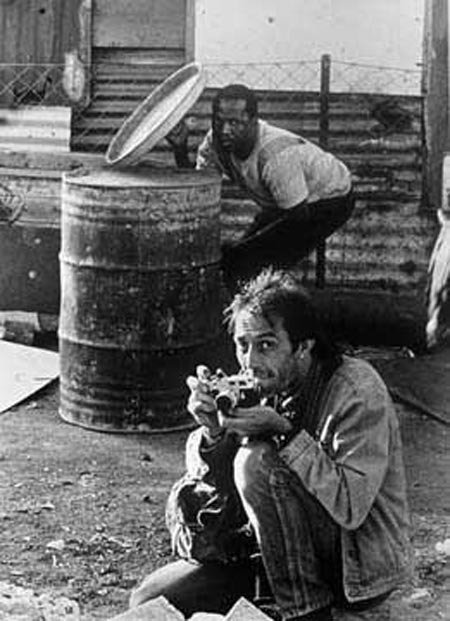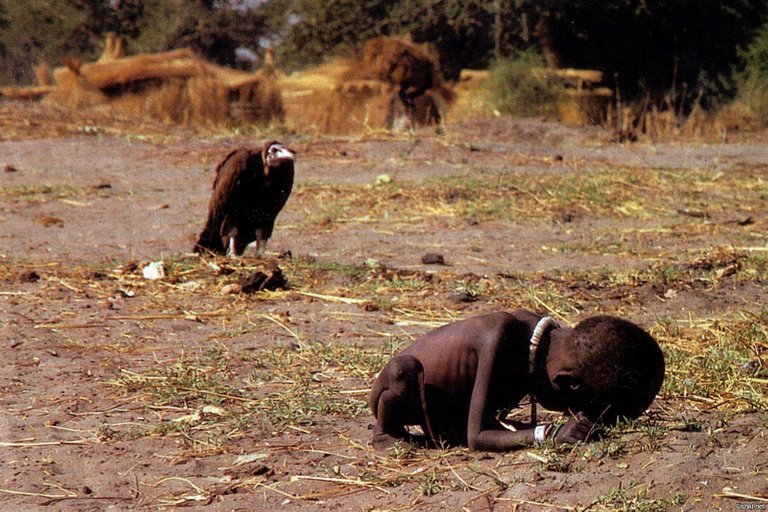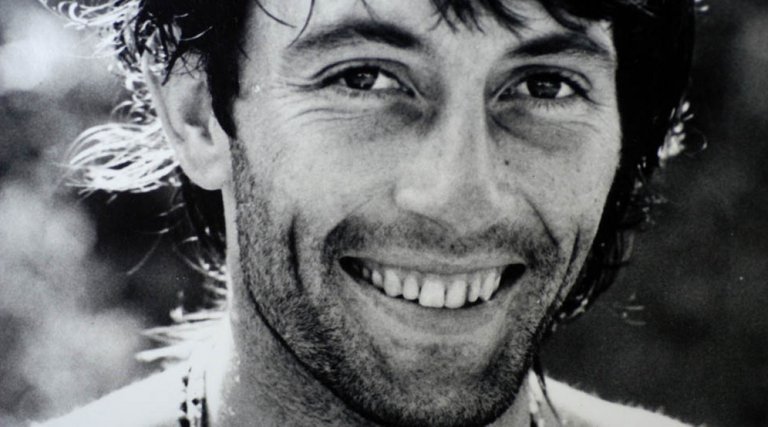Kevin Carter was born in Johannesburg in 1963. His career as a photographer was devoted to coverage of the escalating violence and apartheid in his native South Africa.

In early summer of 1994, Kevin was on top of the world. He had just won the Pulitzer Prize, job offers from famous magazines fell one after another.
"everyone congrats me" — he wrote to his parents, "can't wait to meet you and show you my trophy. It is the highest recognition of my work, which I did not dare to dream".
Kevin Carter won the Pulitzer Prize for the photo "Hunger in the Sudan", shooted in early spring of 1993. On this day, Carter flew to Sudan to shoot scenes of starvation in a small village. Tired of shooting the dead people from hunger, he went from village to small bushes overgrown field, and suddenly heard quiet weeping. Looking around, he saw a little girl lying on the ground, apparently dying from hunger. He wanted to make a photo, but suddenly in a few steps landed vulture. Very carefully, trying not to frighten the bird, Kevin chose a better position and made a shot. Then he waited twenty minutes, hoping the bird would spread her wings and provide him the opportunity to make the better shot . But the damn bird didn't move and in the end he spat and banished her. Meanwhile, the girl apparently had enough strong and walked, or rather, he crawled on. And Kevin sat down near a tree and wept. He suddenly terribly wanted to hug his daughter...

Hunger in the Sudan.
The day after he returned to Johannesburg (South Africa). At this time, the famine in Sudan was a "fashionable" topic and the "new York Times" immediately bought his picture. March 26, 1993 it was published. What happened! The photo immediately became a symbol of plight in Africa, and Kevin Carter became a celebrity. It was a victory! But the real victory came later, may 23, 1994, when Carter won the Pulitzer Prize.
And only one thing clouded the joy. At first quietly, then louder and louder was heard the question: what happened with the girl? Why he didn't help her? Newspapers no longer called him "a brilliant photographer".
"The man calmly adjusts his lens to remove the torment a little girl," wrote the magazine "Time" (FL) — "This man like a predator, one more vulture."
Later Carter told to his friends that he regrets that did not help to girl: there was the camp of United Nations not far, where the hungry assisted. But it was too late. He falls into a deep depression. It affects his work: hurrying to an important meeting he was late for the plane, then loses all photo tapes...
On the morning of 27 July, the last morning of his life — Kevin was in a great mood. Lain in bed until dinner, he went to the editor of the local newspaper, talked with former colleagues. Then he went to the widow of his close friend who was killed a few months ago. About 9 o'clock in the evening the Carter arrived to a small rivulet, with a garden hose connected the exhaust pipe with the interior, put on some music, started the car and ... fell asleep.

"To observe or to intervene?" - this question is faced by almost all reporters working in hot spots. And with that they have to live. But so loudly and vehemently attack of the public sounded to the addresse only of few journalists, Carter was one of them. Maybe it was the last straw in a series of events in 10 years of work.
His work primarily touched the issue of ethics and morality of Western society, not the problems of Africa. Not many of people realize that a journalist photographer is not a soldier, not a doctor, not a Savior, not a hero. It is a conduit, an instrument that connects so different worlds and shows the problems that are not visible from our comfortable life, but they are exist. What is More importantly? Use your limited power to save one person? Or to call millions people for help, to save suffering Nations? Everyone responds on this question to himself, and lives with answer for all life.
thankful for the truth displayed in their photographic journalism
It's really difficult question, but first of all everyone must to do their job.